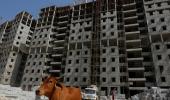A home loan is a long-term contract, so do shop around before signing on the dotted line, advises Sarbajeet K Sen.

Home sales rose sharply once the economy opened up after the second wave of COVID-19, and approximately 237,000 units were sold in the top seven cities in 2021, up 71 per cent year-on-year (YoY), according to Anarock, a real estate consultancy.
One factor that provided a fillip to sales was low interest rates on home loans.
However, interest rates are likely to rise in 2022.
Here are a few factors potential borrowers now need to keep in mind.
Assess repayment capacity
Begin by assessing your loan repayment capacity.
"Home loan lenders prefer an applicant's total EMI (equated monthly instalment) obligations, including that on the new home loan, to not exceed 50 per cent of monthly income. Exceeding this level could reduce the chances of approval," says Ratan Chaudhary, head of home loans, Paisabazaar.com.
Rising interest rates
Persistent inflation could cause interest rates to rise.
Any such rise will initially increase your loan tenure, which could affect your total liability.
Once the loan tenure surpasses certain limits (such as the retirement age for salaried employees), lenders increase the EMI.
"Home loan rates continued to fall during 2021, with some lenders reducing their rates as low as 6.4 per cent. As inflation rises, there won't be room for more cuts. A few financial institutions hiked their fixed deposit rates recently. Some lenders' home loans have also got slightly costlier. Rising deposit rates hint at rising loan costs as well," says Adhil Shetty, CEO, Bankbazaar.com.
If you are going for a floating-rate home loan, do take into account the possibility of rising rates.
Fixed or floating?
With interest rates at record lows, many borrowers wonder if they should lock into a fixed-rate loan.
Very few lenders offer this option.
"Fixed-rate home loans are typically set higher than floating-rate loans. One large private lender, for instance, offers its floating-rate loan at 6.75 per cent minimum and its lowest fixed-rate loan at 7.4 per cent. The difference is significant," says Shetty.
"In a fixed-rate home loan, your EMI will remain constant throughout the tenure. While you will be protected against rising rates, you will also lose out on the benefit of any decline in interest rates in the future," he adds.
Moreover, pre-payment charges apply to fixed-rate loans.
This could increase your overall borrowing cost.
"Pre-payment charges don't apply to floating-rate loans. Avoid going for a fixed-rate loan because of the big difference in rates," says Shetty.
Credit score matters
Check your credit score before applying.
"Build a credit score of 750 and above. Such a score improves the chances of your loan being approved, and at a lower rate," says Chaudhary.
Also get mistakes in your credit report rectified before applying.
Deciding loan-to-value
Loan-to-value (LTV) ratio is the percentage of the property value that a bank or financial institution can lend to a buyer.
According to the Reserve Bank of India's guidelines, the LTV ratio for home loans of up to Rs 30 lakh can go up to 90 per cent.
For higher-value loans, it can't exceed 75 per cent.
Borrowers should opt for a lower LTV ratio.
"This will reduce your overall credit cost. It can also increase the chances of loan approval at a lower interest rate," says Chaudhary.
The home loan you are sanctioned will always be the lower of the amount arrived at by applying the LTV ratio and the amount you are eligible for.
Compare offers
A home loan is a long-term contract, so do shop around before signing on the dotted line.
"Compare the offers in the market based on parameters such as interest rates, processing fees, pre-payment charges, hidden charges, loan transfer process and charges," says Shetty. "Avoid making several applications because this can damage your credit score."

Feature Presentation: Aslam Hunani/Rediff.com












 © 2025
© 2025